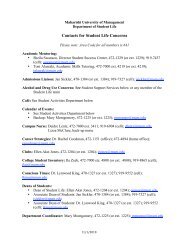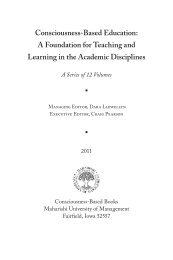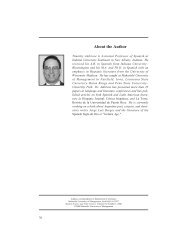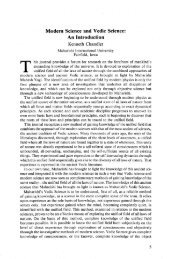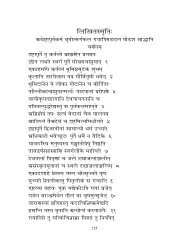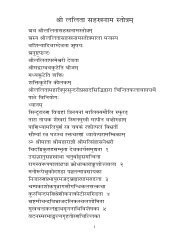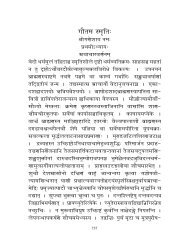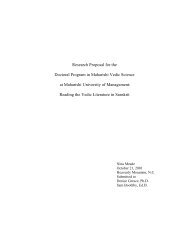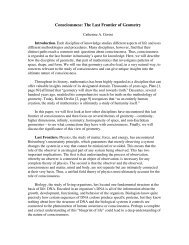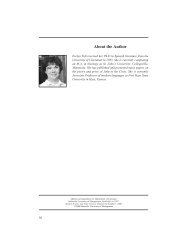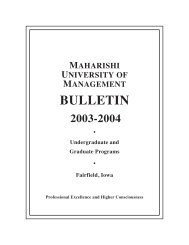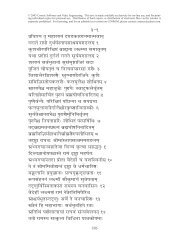The Bhagavad-Gita: A Case Study in Vedic Psychology - Maharishi ...
The Bhagavad-Gita: A Case Study in Vedic Psychology - Maharishi ...
The Bhagavad-Gita: A Case Study in Vedic Psychology - Maharishi ...
Create successful ePaper yourself
Turn your PDF publications into a flip-book with our unique Google optimized e-Paper software.
MODERN SCIENCE AND VEDIC SCIENCE<br />
ч1Н1Г*К'ЧФЧГи| M | :<br />
Mfu^d ^ГГ-<br />
He whose every undertak<strong>in</strong>g is free<br />
from desire and the <strong>in</strong>centive thereof,<br />
whose action is burnt up <strong>in</strong> the fire<br />
of knowledge, him the knowers of<br />
Reality call wise.<br />
(IV. 19)<br />
Hav<strong>in</strong>g cast off attachment to the<br />
fruits of action, ever contented,<br />
depend<strong>in</strong>g on noth<strong>in</strong>g, even though<br />
fully engaged <strong>in</strong> action he does<br />
not act at all.<br />
(IV. 20)<br />
A superficial read<strong>in</strong>g of these verses might suggest that the enlightened person is not<br />
engaged or successful <strong>in</strong> activity. However, <strong>Maharishi</strong> (1967) states very strongly that<br />
this is a misunderstand<strong>in</strong>g. In contrast, <strong>Maharishi</strong> outl<strong>in</strong>es the mechanics of experience<br />
<strong>in</strong> cosmic consciousness, <strong>in</strong> which thought and action are truly powerful and effective<br />
because they are <strong>in</strong> accordance with all the laws of nature:<br />
<strong>The</strong> Lord mentions the special qualities of the action of an enlightened man. <strong>The</strong> action<br />
must certa<strong>in</strong>ly have impetus and an effective start, but the "wise" man is not motivated by<br />
personal attachment <strong>in</strong> beg<strong>in</strong>n<strong>in</strong>g the action any more than dur<strong>in</strong>g its process or at its completion.<br />
Nor does he depend on its fruits. Thus through the whole range of action he is<br />
<strong>in</strong>volved yet not <strong>in</strong>volved.<br />
... Commonly a man beg<strong>in</strong>s an action only when he has become aware of the desire for<br />
it. <strong>The</strong> level at which a desire is appreciated differs accord<strong>in</strong>g to the level of the conscious<br />
m<strong>in</strong>d of the <strong>in</strong>dividual. Men of purer m<strong>in</strong>d appreciate thought and desire at a much subtler<br />
level dur<strong>in</strong>g the process of th<strong>in</strong>k<strong>in</strong>g. It should be understood that a thought starts from the<br />
deepest level of consciousness and develops <strong>in</strong>to a desire when it reaches the conscious<br />
level of the m<strong>in</strong>d. A man for whom the level of transcendental consciousness has become<br />
the level of the conscious m<strong>in</strong>d appreciates the thought at its very start before it actually<br />
develops <strong>in</strong>to a desire. His thought becomes transformed <strong>in</strong>to action without express<strong>in</strong>g<br />
itself as a desire. This expla<strong>in</strong>s how, when a man succeeds <strong>in</strong> harmoniz<strong>in</strong>g his m<strong>in</strong>d with<br />
transcendental consciousness, his "every undertak<strong>in</strong>g is free from desire."...<br />
A man for whom the level of transcendental consciousness has become the level of the<br />
conscious m<strong>in</strong>d has ga<strong>in</strong>ed cosmic consciousness, and <strong>in</strong> this state he experiences Be<strong>in</strong>g<br />
[pure consciousness] as separate from action. This experience creates a natural condition <strong>in</strong><br />
which there is action on the surface and a state of <strong>in</strong>action with<strong>in</strong>. Desire is the l<strong>in</strong>k<br />
between the doer and the action. But when a natural state of separation is established<br />
between the doer and action, there exists no l<strong>in</strong>k between them. In such a situation between<br />
a doer and his action, desire has no place. This is how it is possible for "every" undertak<strong>in</strong>g<br />
to be free from desire....<br />
In the state of cosmic consciousness, where one f<strong>in</strong>ds eternal contentment with<strong>in</strong> oneself,<br />
the Self is self-sufficient—It can have no want. In this state, therefore, every undertak<strong>in</strong>g<br />
is free from the <strong>in</strong>centive of desire.<br />
120



